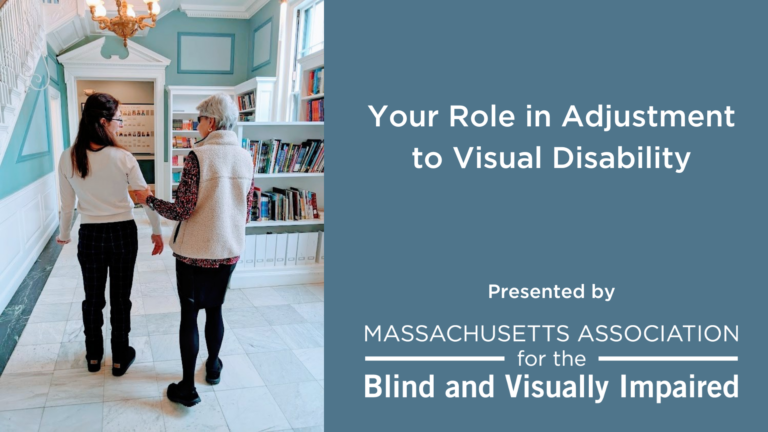Our Story
The Massachusetts Association for the Blind and Visually Impaired (MABVI) was founded in 1903 as the Massachusetts Association for Promoting the Interests of the Adult Blind. MABVI was the first social service agency in the United States dedicated to serving individuals who are blind or visually impaired. Helen Keller served on our first advisory board, along with notable Bostonians Julia Ward Howe (author of “The Battle Hymn of the Republic”) and Edward Everett Hale. Today MABVI and MAB Community Services have been working in Massachusetts communities for more than 100 years, creating opportunities for people with disabilities.
Throughout its first decades, MABVI―an all-volunteer organization―found itself on the cutting edge of what could be considered “the blindness-rights movement.” As broad changes evolved in social and political attitudes towards disabilities in general, and blindness in particular, MAB’s Board responded proactively with specialized services and forward-thinking training and advocacy.
Today, our parent organization, MAB Community Services with over 400 employees and nearly 400 volunteers, supports over 1,200 individuals annually through MAB’s offices in Brookline, Allston, and Worcester.
Read more about our rich history here.
MAB Community Services Timeline
1903-1910
- Programs are coordinated by volunteers who work from a desk at the Women’s Educational and Industrial Union.
- MAB persuades the state legislature to fund a public agency to address the needs of blind individuals (the Massachusetts Commission for the Blind); today, every state has a similar tax-supported entity.
- Social services established at the Massachusetts Eye and Ear Infirmary with financing from MAB.
- “Experiment Stations” established to survey private industry and develop new types of work for blind people. This program is now the vocational rehabilitation function of the Commission for the Blind.
- Initiation and promotion of legislation to require silver nitrate drops in the eyes of newborn infants–thus preventing a major cause of blindness.
- Publication of Outlook for the Blind, a journal to effect communication among workers in the field of blindness. It is now called The Journal of Visual Impairment and Blindness.
1911-1940
- Financial support of the teacher training programs run by Perkins School and Harvard University
- Operation of recreational centers and homes for blind men and women: Woolson House, Rogers House, and Fisher House.
- Training of blind and visually impaired men and women for industrial employment.
- Organization and supervision of vending stands.
1941-1960
- The first professional staff member is hired and a small office is opened in downtown Boston.
- A summer vacation program, Sunlight House, is offered to blind adults, operating until 1976.
- The direct service volunteer program is developed to serve blind people in their communities. This program is still active today.
- Name changes to the Massachusetts Association for the Adult Blind.
1961-1980
- Name shortened to MAB–Massachusetts Association for the Blind.
- MAB opens its Deaf-Blind Education Program to provide services to children born during the rubella epidemic of the 1960s.
- Sight Service Centers open in two inner city neighborhoods to provide services to blind people in their own communities.
- MAB opens its Life Learning program for blind adults with mental retardation who are being de-institutionalized from state facilities.
- First Consumer Advisory Council founded.
- MAB adds Braille and Recording services previously operated by the National Braille Press.
- Vision rehabilitation clinic established in conjunction with Mercy Hospital in Springfield.
- Move to 190 & 200 Ivy Street in Brookline.
1981-2000
- Deaf-Blind Program becomes a Multi-handicapped Children’s program, then is phased out. The Ivy Street School opens to serve children with brain injuries (1993).
- The Team With A Vision begins running in the Boston Marathon®.
- VISION Foundation merges with MAB to form a new department, Vision Community Services, adding in-home rehabilitation and support group services.
- The community residence at 190 Ivy Street is closed and the building sold to finance small group homes for the residents.
- The Cottage Farm Program offers a transitional apartment to Ivy Street School students as they prepare for independent living.
2001-2009
- MAB celebrates its 100th Anniversary
- The Bridgespan Group conducts a five-year strategic plan. The Massachusetts Association for the Blind changes its name to MAB Community Services.
- The Orientation and Mobility Department opens, offering vision rehabilitation services to clients of the Department of Mental Retardation.
- Case Management is introduced to the Vision Community Services Department. A low vision clinic opens in the Central Massachusetts office. Adaptive aid stores and Braille program close.
- The Northdale and Browne Street residences open, providing residential supports to young adults leaving educational programs and transitioning to community living.
- MAB’s vocational programming expands to include a Culinary Arts program and job coaches at the Ivy Street School, and shifts its focus to a community-based employment model.
2010-2018
- The Massachusetts Association for the Blind and Visually Impaired (MABVI) program partners with Section of Geriatrics at Boston Medical Center (BMC) to integrate vision rehabilitation into BMC’s geriatric case management services.
- 12 new Adult Disability Services residences open.
- The Ivy Street School expands to include a Transition Program for young adults ages 18-22 transitioning to independent living.
- Adult Disability Services opens a new MABWorks location, doubling day programming capacity.
- MABVI adds occupational therapists to vision rehabilitation staff, and opens low vision clinics across the state, partnering with eye doctors to provide low vision exams.
- The Ivy Street School reaches maximum enrollment, expanding past brain injury focus to serve students with a diverse range of behavioral and neurological challenges, including autism.
Your Role in Adjustment to Visual Disability (for families and loved ones)
Your Role in Adjustment to Vision Loss is a video module geared toward families and caregivers of loved ones who are adjusting to vision loss.

